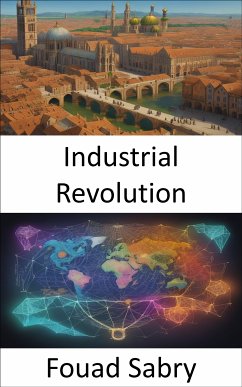What is Industrial Revolution
The Industrial Revolution, also known as the First Industrial Revolution, was a period of global transition of the human economy towards more widespread, efficient and stable manufacturing processes that succeeded the Agricultural Revolution, starting from Great Britain and spreading to continental Europe and the United States, that occurred during the period from around 1760 to about 1820-1840. This transition included going from hand production methods to machines; new chemical manufacturing and iron production processes; the increasing use of water power and steam power; the development of machine tools; and the rise of the mechanized factory system. Output greatly increased, and the result was an unprecedented rise in population and the rate of population growth. The textile industry was the first to use modern production methods, and textiles became the dominant industry in terms of employment, value of output, and capital invested.
How you will benefit
(I) Insights, and validations about the following topics:
Chapter 1: Industrial Revolution
Chapter 2: Manufacturing
Chapter 3: Industrialisation
Chapter 4: Industrial Age
Chapter 5: Cotton mill
Chapter 6: Textile manufacture during the British Industrial Revolution
Chapter 7: Steam power during the Industrial Revolution
Chapter 8: Textile industry
Chapter 9: Line shaft
Chapter 10: Trencherfield Mill
Chapter 11: Proto-industrialization
Chapter 12: Economic history of Europe (1000 AD-present)
Chapter 13: Orme Mill, Waterhead
Chapter 14: Majestic Mill, Waterhead
Chapter 15: Malta Mill, Middleton
Chapter 16: Productivity-improving technologies
Chapter 17: Industrial Revolution in Scotland
Chapter 18: Machine industry
Chapter 19: De-industrialisation of India
Chapter 20: Industrialization in Germany
Chapter 21: History of the cotton industry in Catalonia
(II) Answering the public top questions about industrial revolution.
(III) Real world examples for the usage of industrial revolution in many fields.
Who this book is for
Professionals, undergraduate and graduate students, enthusiasts, hobbyists, and those who want to go beyond basic knowledge or information for any kind of Industrial Revolution.
The Industrial Revolution, also known as the First Industrial Revolution, was a period of global transition of the human economy towards more widespread, efficient and stable manufacturing processes that succeeded the Agricultural Revolution, starting from Great Britain and spreading to continental Europe and the United States, that occurred during the period from around 1760 to about 1820-1840. This transition included going from hand production methods to machines; new chemical manufacturing and iron production processes; the increasing use of water power and steam power; the development of machine tools; and the rise of the mechanized factory system. Output greatly increased, and the result was an unprecedented rise in population and the rate of population growth. The textile industry was the first to use modern production methods, and textiles became the dominant industry in terms of employment, value of output, and capital invested.
How you will benefit
(I) Insights, and validations about the following topics:
Chapter 1: Industrial Revolution
Chapter 2: Manufacturing
Chapter 3: Industrialisation
Chapter 4: Industrial Age
Chapter 5: Cotton mill
Chapter 6: Textile manufacture during the British Industrial Revolution
Chapter 7: Steam power during the Industrial Revolution
Chapter 8: Textile industry
Chapter 9: Line shaft
Chapter 10: Trencherfield Mill
Chapter 11: Proto-industrialization
Chapter 12: Economic history of Europe (1000 AD-present)
Chapter 13: Orme Mill, Waterhead
Chapter 14: Majestic Mill, Waterhead
Chapter 15: Malta Mill, Middleton
Chapter 16: Productivity-improving technologies
Chapter 17: Industrial Revolution in Scotland
Chapter 18: Machine industry
Chapter 19: De-industrialisation of India
Chapter 20: Industrialization in Germany
Chapter 21: History of the cotton industry in Catalonia
(II) Answering the public top questions about industrial revolution.
(III) Real world examples for the usage of industrial revolution in many fields.
Who this book is for
Professionals, undergraduate and graduate students, enthusiasts, hobbyists, and those who want to go beyond basic knowledge or information for any kind of Industrial Revolution.
Dieser Download kann aus rechtlichen Gründen nur mit Rechnungsadresse in A, B, BG, CY, CZ, D, DK, EW, E, FIN, F, GR, H, IRL, I, LT, L, LR, M, NL, PL, P, R, S, SLO, SK ausgeliefert werden.


